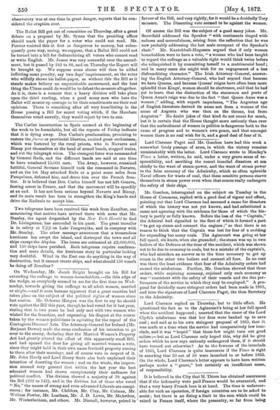On Wednesday, Mr. Jacob Bright brought on his Bill for
extending the suffrage to women-householders,—the thin edge of the wedge, as everybody seemed to see for the first time on Wed- nesday, towards giving the suffrage to all adult women, married or single,—and it soon became apparent that a great reaction had taken place on the subject of the political rights of women since last session. Mr. Osborne Morgan was the first to say he should vote against the Bill this year, though he had voted for it last year, stating that in two years he had only met with two women who wished for the franchise, and expressing his disgust at the course taken by the women-politicians in agitating for the repeal of the Contagious Diseases' Acts. The Attorney-General for Ireland (Mr. Serjeant Dowse) made the same confession of his intention to go over to the enemy, declaring that the Married Women's Property Act had greatly altered the effect of this apparently small Bill, and had opened the door for giving all married women a vote, since they might hold in their own name freehold property coming to them after their marriage, and of course vote in respect of it. Mr. John Hardy and Lord Henry Scott also both explained their intention of deserting the women ; and on the whole, the impres- sion seemed very general that within the last year the best educated women had shown conspicuously their unfitness for political conflict. The division showed a majority of 79 against the Bill (222 to 143), and in the division list of those who voted " No," the names of strong and even advanced Liberals are conspi- cuous ; for instance, Mr. Childers, Mr. Clay, Mr. Colman, Mr. William Fowler, Mr. Leathern, Mr. J. D. Lewis, Mr. McArthur, htr. Winterbotham, and others. Mr. Disraeli, however, paired in
favour of the Bill, and very rightly, for it would be a decidedly Tory measure. The Dissenting vote seemed to be against the women.


































 Previous page
Previous page